Alexander Purdie (publisher)
Alexander Purdie (c. 1743 – 1779) was a prominent colonial American printer, publisher, and merchant in eighteenth-century Williamsburg, Virginia US.
Alexander Purdie | |
|---|---|
| Born | c. 1743 Scotland |
| Died | 1779 (aged 35–36) |
| Occupation | printer and publisher |
| Known for | colonial Williamsburg publisher[1] |
| Spouse(s) | Mary (unknown last name) Peachy Davenport[1] |
| Children | Jennet (b. 1765)[2] James Hugh Alexander William [1] |
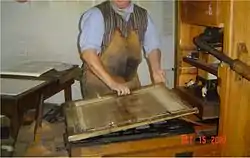
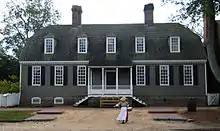

Early life
Purdie is believed to have been born in Scotland by 1743; however, his exact birth date and exact place of birth are unknown.[1] He was trained at an early age in the skills of printing in his motherland.[3] His immigration to the American British colonies is not known for sure; however, by 1764 he took up residence in colonial Williamsburg, Virginia.[1] At that time he was employed by the then current Williamsburg printer Joseph Royle, as an apprentice.[4]
Mid life
Purdie succeeded Royle as editor of the Virginia Gazette on his death in 1766. He formed a partnership with John Dixon until 1774, when Dixon developed a new partnership with William Hunter, the printer at Williamsburg.[5] Purdie then ran a third Virginia Gazette that was similar in articles to the other two Virginia Gazette's being printed in Williamsburg at the time.[6] The newspaper's motto was, "Always for Liberty and the Public Good." Purdie became the official Virginia "public printer" in Williamsburg in 1775, an esteemed lucrative position.[1] He also became the postmaster in Williamsburg by October of that year.[1]
Dwelling
Purdie owned a residence in colonial Williamsburg on a half-acre lot. The legal description of its location is Block 9 Lot 24 and is known further today as building 28A.[2] The house was reconstructed by the Colonial Williamsburg Foundation based on the original underground foundation.[2] It is located on the south side of Duke of Gloucester Street next to the King Arm's Tavern about a block from the Capitol.[2] Purdie purchased the Williamsburg lot and house from the estate of Joanna McKenzie in 1767 with a Dr. James Carter being the administrator. He paid "300 pounds current money of Virginia."[2] The lot already had by 1707 "one good dwelling house thereon."[7] Purdie lived in the house and ran a store that sold yarn goods and wearing apparel from it.[7]
Business
There is good reason to believe that Purdie's printing shop business was located in what is known today as Tarpley's Store.[2] It is located four lots west on lot #20 on Duke of Gloucester Street on the southeast corner at Botetourt Street.[2]
Family
Purdie with his first wife Mary had at least two children.[2] Mary died sometime in or before 1772. It appears that Alexander Purdie, her husband, was selling off her remains of her women's hats business after her death - at or below cost according to his advertisements of July and August 1772.[2] Purdie married Peachy Devenport in December of that year.[2]
Later life and death
Purdie suffered from dropsy in his later years.[8] He died at Williamsburg in 1779.[8]
Political
Purdie favored the American revolutionary patriots’ cause and his Virginia Gazette newspaper articles reflected that voice. In the time period of the American Revolution, Purdie changed his front page design title several times to reflect his solidarity for the cause of the patriots. At first the masthead read, "Thirteen United Colonies" and "United we stand, divided we fall." Later, an image of a coiled snake was on the masthead with the moto "Don’t tread on me" displaced front and center. It was subtitled "High Heaven to Gracious Ends directs the Storm!"[9]
Legacy
Purdie's Virginia Gazette was the first American newspaper to publish the complete full text of the United States Declaration of Independence, which was printed on July 26, 1776.[10][11][12]
The text begins in the middle of the first column with the Declaration of Independence introduction:
When in the Course of human events, it becomes necessary for one people to dissolve the political bands which have connected them with another, and to assume among the powers of the earth, the separate and equal station to which the Laws of Nature and of Nature's God entitle them, a decent respect to the opinions of mankind requires that they should declare the causes which impel them to the separation.
Works
Below are examples of works attributed to Purdie as the printer.
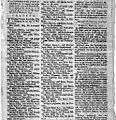 At a convention of delegates for the counties and corporations...1775
At a convention of delegates for the counties and corporations...1775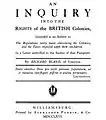 An Inquiry into the Rights of the British Colonies
An Inquiry into the Rights of the British Colonies
by Richard Bland 1776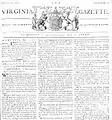 Declaration of Independence
Declaration of Independence
Virginia Gazette
July 26, 1776 An act for raising volunteers to join the Grand Army...1777
An act for raising volunteers to join the Grand Army...1777 Articles of confederation and perpetual union between the states...1777
Articles of confederation and perpetual union between the states...1777
See also
Footnotes
- "Colonial Williamsburg (mobile) / Alexander Purdie". Colonial Williams Digital Library. Colonial Williams Foundation. 2013. Retrieved 28 November 2013.
- "Alexander Purdie House Historical Report, Block 9 Building 28A Lot 24". Colonial Williamsburg Digital Library. Colonial Williamsburg Foundation Library. 1990. Retrieved 28 November 2013.
- "The Printing Office and Post Office Archaeological Report Block 18-2 Building 12B Lot 48 / XLIV ALEXANDER PURDIE". Colonial Williams Digital Library. Colonial Williams Foundation. Retrieved 28 November 2013.
- "Purdie's Dwelling, Block 9 Colonial Lot 24". Colonial Williamsburg Foundation Library Research Report Series. Colonial Williamsburg Foundation Library. 1990. Retrieved 28 November 2013.
- Tyler 1907, p. 236.
- "A History of The Virginia Gazette". A Tribune Newspaper website. The Virginia Gazette newspaper publication. 2002. Retrieved 28 November 2013.
- "King's Arms Tavern and Alexander Purdie House Architectural Report, Block 9 Building 28A & 29A Lot 23 & 24". Colonial Williamsburg Foundation Library Research Report Series. Colonial Williamsburg Foundation Library. 1990. Retrieved 28 November 2013.
- Bryson 2000, p. 528.
- "Transcript of Publishing the Declaration of Independence". Journeys & Crossings. Library of Congress. 2010. Retrieved 28 November 2013.
- Lee 1917, p. 51 A fourth Gazette was started in Williamsburg on February 3, 1775, by Alexander Purdy and was conducted by him until 1779. Its motto was, "Always for Liberty and the Public Good." This particular Virginia Gazette has the honor of being the first American newspaper to print the full text of the Declaration of Independence which it did on July 26, 1776..
- "History of American journalism". "A fourth Gazette was started in Williamsburg on February 3, 1775, by Alexander Purdy and was conducted by him until 1779. Its motto was, "Always for Liberty and the Public Good." This particular Virginia Gazette has the honor of being the first American newspaper to print the full text of the Declaration of Independence which it did on July 26, 1776.". Internet Archive. 2012. Retrieved 28 November 2013.
- Library of Congress 1970, p. 459.
Bibliography
- Bryson, William Hamilton (2000). Virginia Law Books: Essays and Bibliographies. American Philosophical Society. ISBN 978-0-87169-239-9.CS1 maint: ref=harv (link)
- Lee, James Melvin (1917). History of American Journalism. Houghton Mifflin Company. p. 51.CS1 maint: ref=harv (link)
- Library of Congress (1970). The National union catalog, pre-1956 imprints: a cumulative author list representing Library of Congress printed cards and titles reported by other American libraries. Mansell. ISBN 9780720108484.CS1 maint: ref=harv (link)
- Tyler, Lyon Gardiner (1907). Williamsburg: The Old Colonial Capital. Whittet & Shepperson. p. 236.CS1 maint: ref=harv (link)
External links
| Wikimedia Commons has media related to Alexander Purdie. |